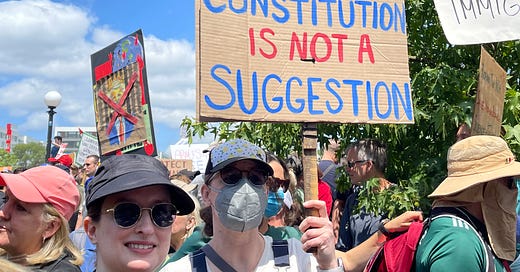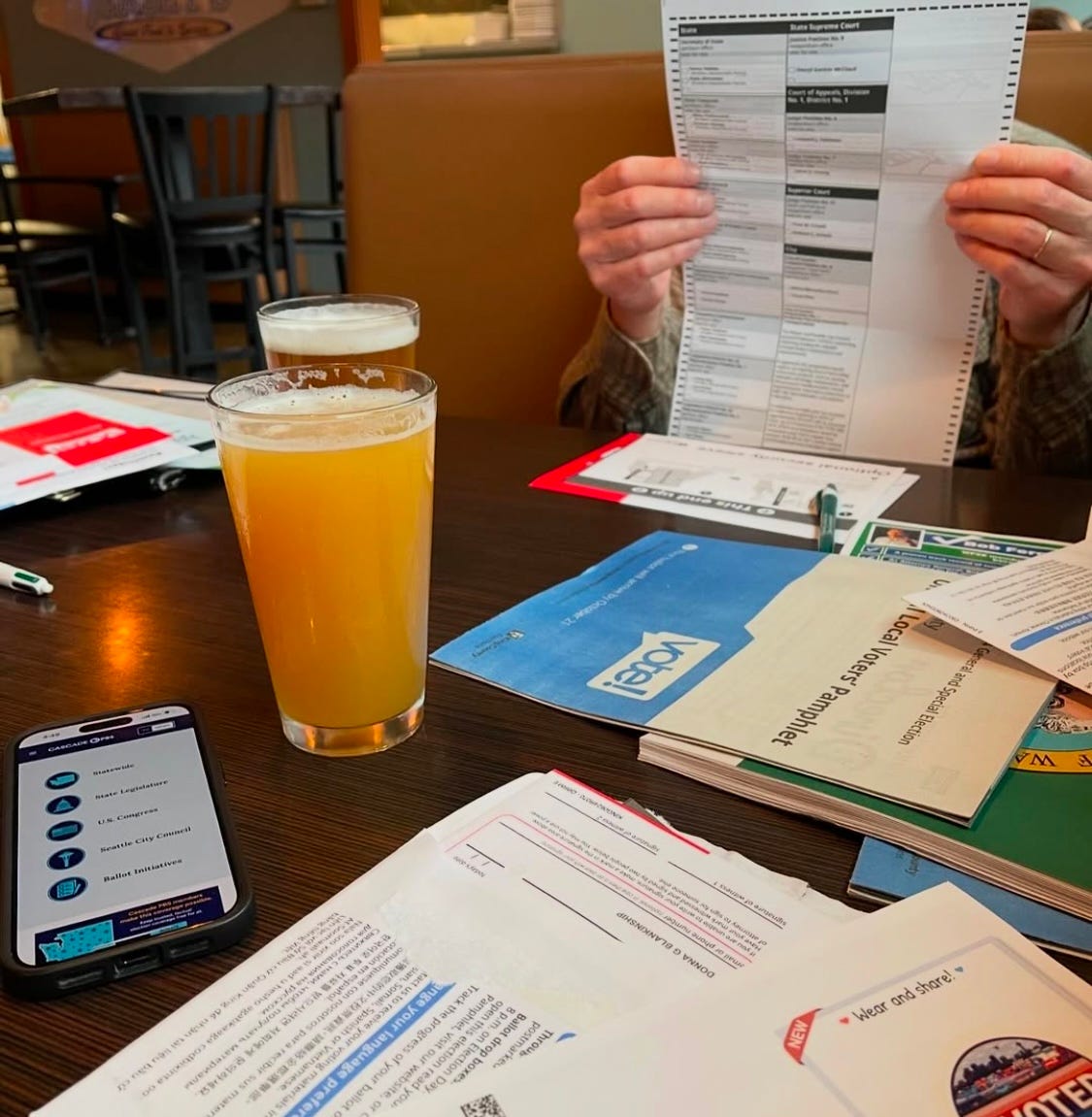Voting is your American superpower
Protests are fun and make a difference, but voting is even more important, so make sure your registration is up to date.
While I found last weekend’s massive U.S. protests inspiring, I do not believe marching, chanting and waving clever signs is the most effective way to combat bad or immoral government policies. The American people have an even stronger tool in their toolbox: Voting.
Please don’t interpret that to mean that you should stop protesting and calling your lawmakers to tell them what to do. You should definitely continue to do those things. But if you’re not planning to vote – every time there is an election – then maybe you shouldn’t bother voicing your opinion in other ways. Voting is your superpower.
Smiles and signs at the “No Kings” protest in Seattle. (photo by Donna Blankinship)
Every election since 18-year-olds gained the right to vote with the passage of the 26th Amendment in 1971 (and probably before then, but I was too young to remember) potential American voters have been saying their vote can’t make a difference so why bother. Excuse me! Every vote does count, both in the aggregate and individually.
In 2005 in my state, Washington, Gov. Chris Gregoire was sworn in after winning by 129 votes.
President John F. Kennedy defeated Richard Nixon in 1960 by a margin of fewer than 120,000 votes out of 68.8 million cast. His win looked like a landslide because of the Electoral College victory of 303 to 219 votes, but it was one of the closest presidential elections in history.
In 2000, in one of the craziest presidential elections in history, George W. Bush was eventually declared the winner over Al Gore but the final results took weeks because of vote counting irregularities in Florida. Bush won the Electoral College with 271 votes to Gore’s 266 but he lost the popular vote by about 500,000.
I’ll write a post someday on the Electoral College, its history and why many people want to get rid of it. These races are only a few of the controversial ones you can find with a quick perusal of the Internet.
Elections are getting closer
According to the Council on Foreign Relations, presidential elections have gotten closer and closer over time and the probability of voters in one state or a handful of states deciding the election has become much greater. Because local and statewide races involve a small number of voters, people are even more likely to win by just hundreds or thousands of votes.
But that’s just math. Voting is also about pride and power and the right to tell your mayor, your congressional representative and the president: “Here’s what I think you should do and I’m not going to vote for you if you don’t.”
My sister shows off her “I vote” button. (Photo by Joyce Gordon)
If you don’t like President Donald Trump’s approach to governing and think Congress has abdicated its duties as a check on Trump’s power, we need a solid voting plan to stop him in his tracks. The only real way to do that is for the country to elect a Democratic majority in the U.S. House and Senate. And if you want to make sure that happens in 2026, even if you live in a blue district, you have to vote. Want to do even more? Convince your friends to vote as well.
The same is true for anyone who likes the direction Trump is taking us. If you want to keep that momentum going, you have to vote in next year’s congressional election.
Here’s an interesting data point for those who believe you can’t make a difference by voting: There are now about 76 million American adults aged 18 to 35; and 55.8 million Americans are 65 or older. But older adults vote in much higher percentages. In 2020, 72% of people aged 65 or older voted in the November election, while just 48% of those 24 and younger and 55% of those 25 to 44.
So while they represent a much smaller segment of the population, Baby Boomers are the people who decide U.S. elections. The ability to change that is in the hands of everyone under 45. All you have to do is vote.
The basics: How to vote
More about the reasons for voting in a second, but first here’s the basics.
To register to vote or update your registration, go to vote.gov and find your state voting site. Or you can go directly to your state, of course, if you know that address. You may also be able to register to vote when you’re at the DMV renewing your driver’s license, but online is easier. You need to update your voter registration if you have changed your name or moved.
While you’re in your state voter registration site, sign up to receive your ballots in the mail. I know it’s more “fun” to vote in person, but voting by mail is so much easier and more likely to lead you to vote in every election. You will also have more time to fill out your ballot and do any necessary research if you are voting at your kitchen table or at a pub, like my family does.
Voting with beer is my family tradition. (photo by Donna Blankinship)
Most states allow you to easily sign up to vote by mail, and some just send you every ballot in the mail, like Washington, California, Oregon and Vermont. A few require you to come up with an excuse why you need to receive your ballot at home. This website will help you make it happen no matter where you live.
Please give voting by mail a try. I think you’ll like it and plus you will gain bragging rights for voting in the water district election and for your city council.
More reasons to vote
Now for a word on what to do if you dislike one or two proposed policies of the candidate representing your preferred party. Or if you just don’t like the candidate herself and wish someone else was running. This is my least favorite argument used by people who sat home during the 2024 presidential election or voted for a third party candidate.
First, you are not required to like the person you vote for; you will probably never be invited to the White House or the governor’s mansion for a beer. Second, think big picture and do not focus on one or two issues that are not even likely to be the most important issues of that term. Being president gives you authority over so many things, for example, who do you want to decide whether we go to war with Iran this week? And third, third party candidates do not win the presidency within our current system but they can capture enough votes to turn a winner into a loser.
The first time I voted, as a 19-year-old in 1980, I and many of my fellow young people chose a third party candidate for president. I’d tell you his name but you do not remember him. What you do remember is who won and who lost that election. And Ronald Reagan’s defeat of Jimmy Carter would have been a lot closer if the third party candidate didn’t capture nearly 7% of the vote.
If you want a more meaningful explanation of the importance of voting, ask any Black woman (or Black man) above age 50. They likely remember their mother or aunt or grandmother talking about not being able to vote until 1965 and what it meant to them when the Voting RIghts Act passed. Black women were part of the women’s suffrage movement in the 1800s, but when the 19th Amendment was added to the Constitution in 1920, only white women earned the right to vote. Black men became voters in 1870 with the passage of the 15th Amended, in case you have forgotten.
Table of Contents [Start Here]
Welcome to the wayback machine for Civics for Adults. Start here if you’re new to this newsletter and want to get caught up, or if you want to find a post you think you read here before.
Constitutional Law for beginners
Let’s take a step back this week and study America’s foundational documents. Knowledge of the U.S. Constitution and its amendments will help you understand the debate surrounding Trump administration actions and why opponents are using the courts to defend democracy. While all three branches of government are touched by politics – yes, even the judiciar…
Stay safe: Legal rights for protesters
The First Amendment guarantees your right to protest. But it’s not an unlimited protection for free speech and peaceful assembly. You should pack some legal knowledge in your bag as you head out to that rally or march.







![Table of Contents [Start Here]](https://substackcdn.com/image/fetch/$s_!xY6y!,w_280,h_280,c_fill,f_auto,q_auto:good,fl_progressive:steep,g_auto/https%3A%2F%2Fsubstack-post-media.s3.amazonaws.com%2Fpublic%2Fimages%2F867a5af7-55dd-46c9-ad47-e1e4a6e47f47_4032x3024.jpeg)


I vote!